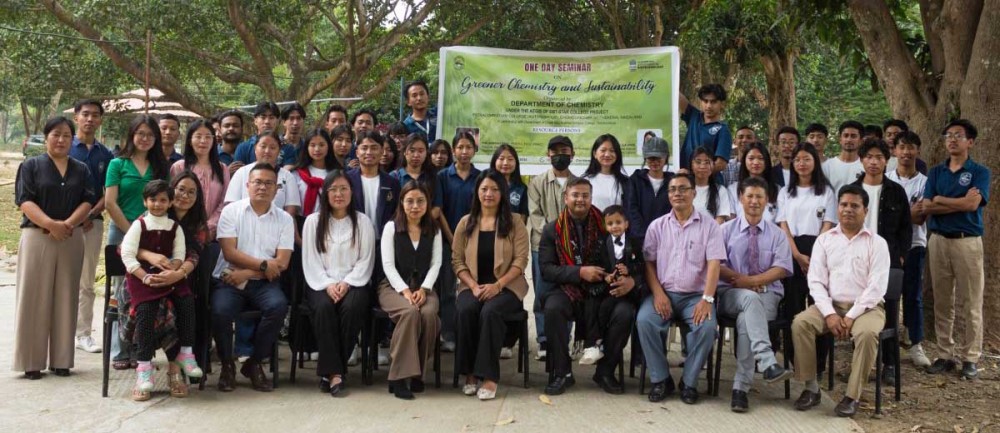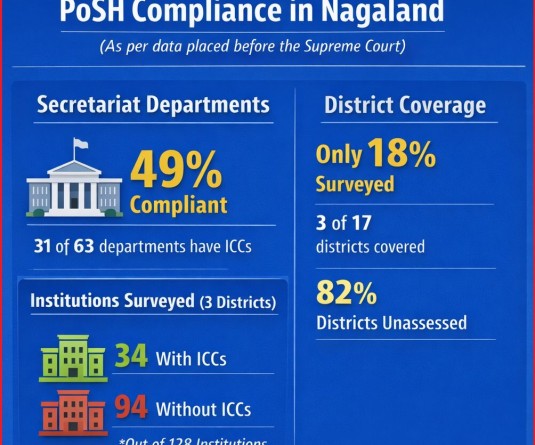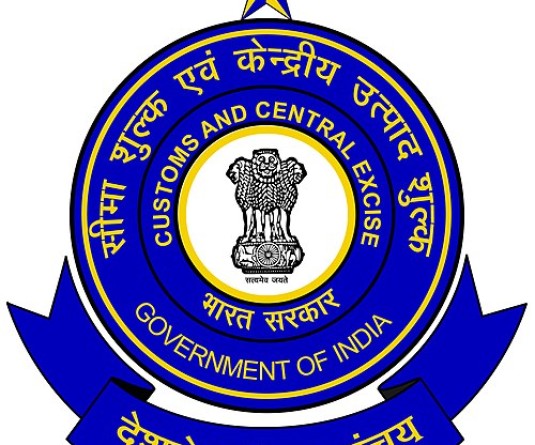Faculty members, students, and experts at the seminar on “Greener Chemistry and Sustainability” at Patkai Christian College, organized in collaboration with Kohima Science College under the DBT-Star College Project.

DIMAPUR, MARCH 23 (MExN): The Department of Chemistry, Patkai Christian College (Autonomous), in collaboration with the Department of Chemistry, Kohima Science College (Autonomous), hosted a one-day seminar on “Greener Chemistry and Sustainability” under the aegis of the DBT-Star College Project. Held at the Conference Hall of Patkai Christian College (PCC), the seminar brought together faculty members, students, and experts in the field of chemistry and environmental sciences to discuss sustainable chemical practices.
The event commenced with an inaugural session chaired by Dr. T. Moalenla Ao, Assistant Professor and Head of the Department of Chemistry, PCC. Ramkashem Ramsan, a senior faculty member of the department, delivered the welcome address, while Dr. Merangmenla, Assistant Professor at PCC, served as the rapporteur.
In the first session, Professor Ambrish Singh (FNESA, FICS, FRSC), a professor in the Department of Chemistry at Nagaland University, delivered a keynote address on “Sustainable and Environmentally Benign Green Corrosion Inhibitors.” He provided an overview of green chemistry, tracing its history and discussing the 12 guiding principles that underpin sustainable chemical practices.
Professor Singh emphasized the need to minimize chemical derivatives, adopt biodegradable materials, and incorporate renewable energy sources such as solar power in chemical processes. One of the key highlights of his presentation was an innovation he developed—a biodegradable, balloon-like capsule designed to store energy drinks or water. The capsule, which dissolves in the mouth, uses microbial fuel cells and is intended for athletes and marathon runners as a sustainable hydration alternative.
Additionally, Singh discussed the importance of rainwater harvesting, bamboo-based alternatives to plastic packaging, and the application of green chemistry in pharmaceuticals, agrochemicals, and nanomaterials. He underscored the idea that sustainability is rooted in nature and can be achieved through continuous innovation. His session concluded with an interactive discussion, allowing participants to explore future applications of green chemistry.
The second session, chaired by Dr. Daniel Kibami, Assistant Professor at Kohima Science College (Autonomous), featured a presentation by Dr. Latonglila Jamir, Associate Professor in the Department of Environmental Science at Nagaland University. Speaking on “Green Chemistry Approaches for Sustainable Organic Synthesis,” she emphasized the importance of developing eco-friendly chemical synthesis methods.
Dr. Jamir highlighted the need to minimize waste, use renewable feedstocks, and adopt greener solvents in organic reactions, illustrating how green chemistry principles can be applied across various industries to reduce environmental impact while improving efficiency. She also discussed advancements in sustainable industrial processes that align with global efforts to mitigate environmental degradation.
The seminar concluded with a vote of thanks by Dr. Bendangsenla N, Assistant Professor, Department of Chemistry, PCC. The event provided a valuable platform for students and faculty members to gain insights into recent advancements in green chemistry, reinforcing the significance of sustainable scientific practices in addressing environmental challenges.






